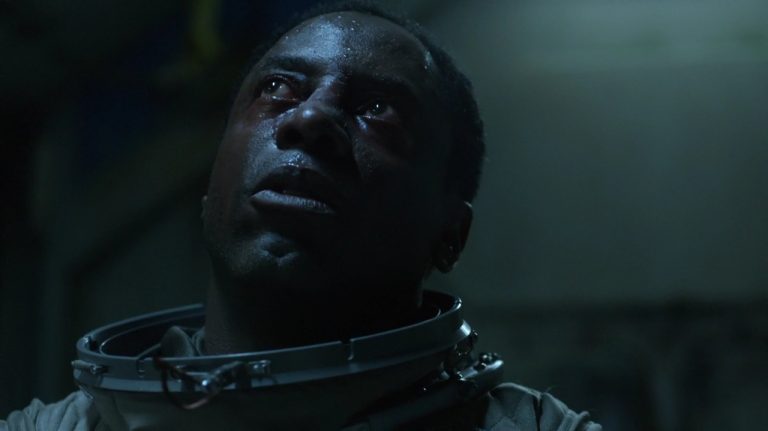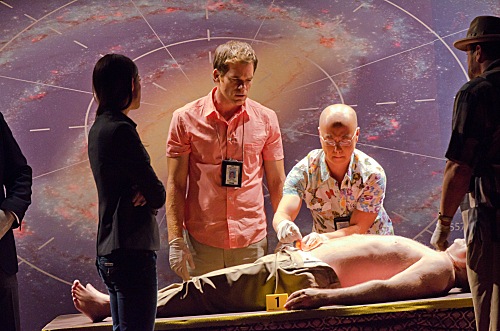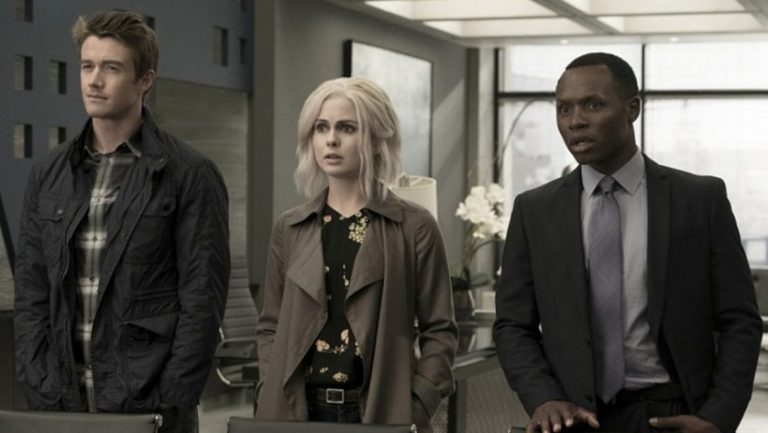
There seems to be a certain magic—or at least a special connection for me—with starting a show right after the third season airs. I fell in love with the X-Files, my first love, the summer between the third and fourth seasons. My second love was Supernatural, and I watched all three seasons the summer before the fourth season aired. With that kind of track record, I shouldn’t have been surprised when I became very attached to Sherlock…
Sherlock’s third season finished up earlier this year. Unlike our American shows that generally have a season with between 20 and 23 episodes, Sherlock’s seasons are three events, one and a half hours each. Essentially that makes their seasons each the equivalent of about six of our episodes. Deeply depressing, yes, but at least the episodes are more like mini movies than a television show—and you don’t have to deal with filler episodes.

Good news is that Sherlock has been green lit by the BBC for a fourth series as well as a Christmas Special. The less than good news is that the Christmas Special is not this Christmas, but NEXT Christmas—Christmas 2015. The fourth series will be after that time, it seems in early 2016. But again, good news, have some time to write up reviews for each of the episodes and ponder over what the PTB plan to do to bring back Professor Moriarty! I have a theory on that—which I will talk about later. Well, unless I need to talk about it before I get to His Last Vow, which may very well happen…
But beginning at the beginning…

I have read Sherlock Holmes stories off and on pretty much since I learned to read. When I was a little girl, I wanted to be Nancy Drew. I still do actually…but as far as Sherlock Holmes was concerned, I always felt that there was an element of cheating involved in Doyle’s mysteries. The way the mystery genre generally runs, the reader’s wits are put up against the master sleuth’s. Can the reader figure out what is happening before the master sleuth does? With Sherlock Holmes, it is impossible to figure out what is happening because you don’t know everything Holmes knows until he tells you what he has seen and deduced. The story is passed through an intermediary—Watson—who tells us what he sees and what Holmes tells us. We are left in awe of Holmes and his method—finding out that it would have been easy to figure stuff out if we had seen what Holmes had seen. This aspect of the mysteries generally put me off a little bit—I liked the prospect that I might be able to figure out what was going on on my own.

From the first moment of finding out the first episode’s title, “A Study in Pink”, I was taken in. Doyle’s very first Holmes story was “A Study in Scarlett”, appearing in Beeton’s 1887 Christmas Annual. This is actually the most expensive magazine in existence, by the way. I was amazed with how Steven Moffat and Co. were able to update Holmes, yet stay very Doyle-esque. Certain elements of the story stay the same. The “rache” is reversed, being written by the person who was dying and actually attempting to spell “Rachel” as opposed to the original story where the police believe the murderer was attempting to write “Rachel” and he was actually writing “rache”. The “rache” was an attempt to throw off the police, whereas here the “Rachel” was an attempt to help the police by giving her password to find her phone. As far as Holmes and Watson are concerned, Watson is back from Afghanistan looking for cheap accommodations, and potentially a flatmate…just like in “A Study in Scarlett”. In this modern Holmes, Sherlock has a website “The Science of Deduction” where he posts his studies on various types of tobacco, various types of perfume as well as other things about his deductions. Watson also has a blog, initially suggested by his therapist. He memorializes their adventures on his blog which is discussed from time to time on the show.

Mycroft is a bigger character in the series, being brought in right away instead of coming in, if I remember correctly, one short story before “The Final Problem”. It is a very interesting relationship that is very fun to watch. There are a lot of big brother/little brother things going on around these two brainiac men. Remembering Mycroft as described in the stories, and Mycroft as he is depicted by Stephen Frye, seeing Mark Gatniss’s portrayal took a little bit of getting used to, but is well worth doing. He really is a great Mycroft. I would have to say that Frye’s Mycroft seems way less concerned about his brother. Mycroft as played by Gatniss has the outward appearance of not caring (as far as what he wants Sherlock and John to believe), but his actions speak to other intent. I really see Mycroft as acting like the big brother who doesn’t want his affection to be known, although it is definitely there.

Also brought up right in the first episode was the idea of Moriarty. We don’t see him, but we find out that Moriarty has essentially orchestrated things. I really liked this addition. Although we do not hear of Moriarty in the stories until “The Final Problem”, we do find out that although Professor Moriarty did not do things himself, he had a crazy network of people doing all kinds of evil, criminal work. I like that here Moriarty’s pull is established early, creating a more seamless introduction. I think that Doyle didn’t establish Moriarty from the beginning because he never intended for Holmes to become such a thing. Later, when he wanted to do away with Holmes, he needed to create someone capable of taking him out. This meant the person was going to have to be bigger than any of the people had been that Holmes had faced. In my opinion, if Doyle had intended for Holmes to span the breadth he wound up spanning, he would have created Moriarty early…so this really works. I would have to say that the series does an excellent job of staying within cannon yet spinning it in a wonderful way.

There are some new characters as well as some characters given more meat than they are given in the stories. Additonal characters include Anderson and Donovan, who work with Lestrade and both really dislike Holmes. Well, Donovan changes his mind and Anderson becomes less hostile, but that is later…We also have Molly Hooper, who is in forensics. She reminds me a bit of a geeky version of Scully—always doing autopsies. Molly, of course, has a thing for Sherlock, and through her we see how Sherlock doesn’t always treat people very well. Detective Inspector Lestrade and Mrs. Hudson are two characters that we know from the stories peripherally, but get much more information about them and their love of Sherlock in the series.

Which brings me to Sherlock. Whereas I loved RDJ’s Sherlock because he made Sherlock so empathetic, I love Benedict Cumberbatch’s Sherlock in spite of his best efforts to be the dick Holmes can be in the stories. I can’t help but feel that Cumberbatch’s Sherlock is spot on for what Doyle intended. His ability to reason, use his logic and deduce the answers rises way above the level of taking pride in his work. It is his vanity. He won’t allow himself in any relationships that might compromise his ability to fully access that logic and reason. He narrowly focuses on finding the answers to problems to the exclusion of emotions for just about anything and anyone. While I still think that Holmes is too altruistic (even though he would deny this altruism) to truly be a sociopath, it is at the very least the persona he wants to show. Emotions will not help him solve crimes, obtain answers…they only get in the way.
In “A Study in Pink”, we see Holmes in all his glory—his lines about how vacant everyone around him is, texting Watson to come back to the apartment and once he gets there having him send a text for Holmes…and forgetting about Watson at a crime scene, too, because he is so absorbed in his thoughts. His need to stop the boredom at just about any cost…it is all there. It is very clear from the script that Steven Moffat really knows and loves Sherlock Holmes.

“A Study in Pink” starts with three apparent suicides that the authorities believe must be connected somehow. All three died by poison, all three were somewhere they weren’t supposed to be. But how can there be serial suicides? Random texts to all present at the press conference seem to agree that the authorities don’t have all the answers. John Watson, back from the war after being injured, is now trying to find a way to survive in London on an Army pension. He runs into an old friend who thinks he might know someone who can help him, as Watson is the second person that day to bring up the idea of finding a flatmate. The friend brings Watson to meet Sherlock Holmes, who after looking at Watson’s phone knows enough about him to think that flatmates might work…Although no one has asked him yet. 221B Baker Street looks like a great place to live, and Mrs. Hudson, the landlady, got some help from Sherlock years back regarding her husband.

Sherlock and John aren’t actually at the flat very long before Lestrade shows up asking for Sherlock’s help. There has been a fourth “suicide” and now there is a note. Sherlock is incredibly excited and asks John to come along as he knows Anderson in forensics won’t work with him. Sherlock is ecstatic to find out that the killer has made a mistake—these are murders and if they find the case that the pink lady was definitely carrying, they will find their killer.

Or sort of anyway…the cabby is essentially forcing people to choose one of two pills. One is poison, one is not. They take the one with the poison and die. And the cabby has an aneurism ready to go and is on borrowed time! The difference from the original Study in Scarlett is the motivation. Here, the cabby is essentially under the employ of a sponsor who is willing to pay a certain amount of money to the cabby’s children for every person he takes out. Sherlock is able to get the name of Moriarty out of the cabby after Watson shoots him. The scene is really great, as we see that Watson really saved Sherlock. Sherlock claims that he wouldn’t have taken the pill, but it looked like he really wanted to. Sherlock needed the validation that he was more clever than this man…and this is a theme we can see going forward…Sherlock’s vanity over his logic and reason requires that validation. Does Sherlock actually care about solving crimes? Does he care about these people that he is saving? Or is Sherlock’s motivation more selfish? Does his ego require the external validation provided by the grateful “would be” victims? That isn’t an easy question, since Sherlock doesn’t seem very at home with publicity and is socially handicapped to the extreme. These layers though make for a very interesting lead character stunningly portrayed by Cumberbatch.

I’m writing this first episode review after watching the entire series to date. I’m very excited to see where the Christmas Special and Season Four go! Let me know what you though of the episode and the series! Screencaps from screencapped.net/tv/sherlock.




